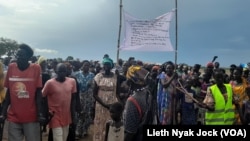The U.N. humanitarian coordinator in South Sudan, Peter Van der Auweraert, revealed that humanitarian aid agencies have only received 46% of the requested $1.7 billion for operations in the country, hampering services the global agency aims to provide.
The U.N. has vowed to continue supporting the 3.2 million people, including returnees from Sudan, facing the highest levels of food insecurity, but some IDPs are expressing deep concern about the future.
In Unity State's Bentiu U.N. protection site, protests erupted last week as the World Food Program suspended food rations, affecting more than 100,000 IDPs.
WFP deputy country director for South Sudan, Shaun Hughes, attributed the suspension to the funding shortage.
Hughes says due to the global funding constraints only 2.2 million South Sudanese will now receive food assistance, down from 7.8 million people.
Solomon Yien Chang, a community leader, says the WFP had provided each IDP in Bentiu 19,000 South Sudanese pounds ($19) in July, before announcing the suspension.
The suspension of food rations has led to misinformation and disinformation among the IDPs. Some believe the U.N. agencies had unilaterally chosen to reduce food assistance, despite consultations with camp leadership.
Nyadiet Roam, a protester at the Bentiu protection site, urged U.N. agencies to acknowledge their suffering.
"We came here to show ourselves that we are suffering, and many people have died in the camp. We are saying that we shall not finish; let the UN agencies see first what is killing us because it is hunger,” she said.
The U.N.'s budget cuts have forced some South Sudanese to consider leaving the IDP camp, but flooding has left them with few options for shelter and food production.
While the WFP acknowledged the protest, they remain concerned about food insecurity in Bentiu.
Meanwhile, Rebecca Yom, a resident at Mingkaman IDP Camp, in Lakes State, said the situation has been challenging.
“We have not received food for the last two months. That is a challenging situation for us IDPs. We are experiencing drought. Please, don't stop providing food for us. There is no one who can live without food," Yom said.
Another IDP in Mingkaman, Mary Adau, said the impact of irregular rainfall has hammered their ability to produce their own food.
"As you know, we usually harvest our sorghum in August. Now, we are trying to plant some sorghum and there is no rain. I see that there will not be a good harvest this year, and in the coming year, we expect to see hunger because we have produced nothing," she told VOA.
Long-term solutions amidst donor dependency
Manasseh Lomole Waya, the head of South Sudan's Relief and Rehabilitation Commission, says the country must seek peace and stability as a long-term solution to reduce reliance on humanitarian assistance.
"We are all aware that funding internationally is going down because of geo-politics and other natural calamities that are affecting many parts of the world. So the only thing we can do in totality is to create an environment that enables our people to work for themselves," Waya said.
South Sudan's humanitarian needs have been worsened by an influx of returnees and refugees from neighboring Sudan.
UNHCR says countries receiving refugees — Central African Republic, Chad, Egypt, Ethiopia and South Sudan — were already hosting hundreds of thousands of displaced people.
South Sudan's humanitarian affairs minister, Abino Akol, says the government has allocated $5.3 million for the response to the influx of people from Sudan and an additional $10 million for the humanitarian crisis.
Nevertheless, the government acknowledges its limitations in addressing the escalating humanitarian needs.
Hughes reaffirmed WFP's commitment to providing nutrition support to mothers, malnourished children, and school milk to students.
In February, U.S. ambassador to South Sudan Michael J. Adler announced a $288 million donation from the Biden administration to address humanitarian needs, but funding remains a critical issue for South Sudan's vulnerable populations.

Forum